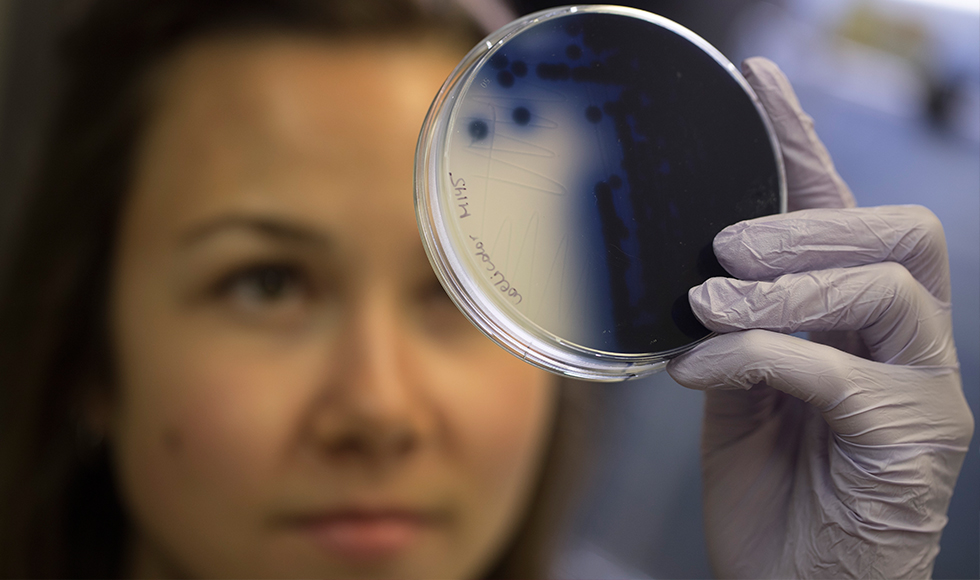Joining the fight against the world’s deadliest superbugs

BY Tina Depko
January 17, 2018
Beth Culp is driven by a primary goal: to discover a new antibiotic.
The Vanier scholar based in Gerry Wright’s lab in the Michael G. DeGroote Institute for Infectious Disease Research at McMaster University is working to make a discovery that will help the human race.
“It is challenging work, but it is so satisfying at the same time,” says Culp, who is in her third year of a PhD in biochemistry and biomedical sciences. “You feel like you are doing something that can help people.”
Culp’s research focuses on deriving new antibiotics from molecules produced by bacteria.
“Most antibiotics that are in use are derived from natural products produced by soil microbes in a family of bacteria called Actinomycetes,” she notes.
“Unfortunately it is getting harder and harder to find new antibiotics from this source, so I am leveraging new technologies in order to likewise uncover new molecules.”
She says the search for these new antibiotics cannot be overstated.
“Antibiotic resistance is a huge topic nowadays,” she says.
“You’ve probably seen news about superbugs that can’t be treated with any of the antibiotics that we have today, so it is important that we find new therapies to treat these infections.”
Culp came to McMaster in 2011, drawn to the undergraduate program in Biology. A chance to work in a lab in her first year drew her to research. The years between have since cemented her career choice as a researcher.
Gerry Wright, director of the Michael G. DeGroote Institute for Infectious Disease Research, says he was pleased to support Culp’s nomination for a Vanier Canada Graduate Scholarship.
“Vanier scholars are the leaders of tomorrow and there are only a few people who have all of those skills – someone who is smart, thinks beyond their specific project, brings others along with them as a leader and does that much more than anyone else,” notes Wright, professor of biochemistry and biomedical sciences at the Michael G. DeGroote School of Medicine.
“Beth is a leader of tomorrow. She is a remarkably talented researcher and I think the sky’s the limit for her.”
Culp spends most of her day working in the lab, and like many other researchers, often weekends, as well.
“With the nature of biological work, the bacteria don’t care it is the weekend, they keep growing no matter what,” she quips.
Culp says she makes time for extra-curricular activities, which give her mental clarity and focus in the lab. She plays trumpet in a community band, teaches spin classes and runs on trails through Hamilton.
She encourages undergraduate students looking to her as inspiration to foster school-life balance, as well as to find ways to incorporate research into their educational experience.
“There are all sorts of cool things in research you can do as an undergraduate, so take the opportunity to write a thesis to get a taste of what research is like,” she says. “Take every opportunity to apply for scholarships or do internships. Don’t let anything hold you back.”
Culp says she will be seeking a permanent research position upon completion of her PhD.
“Finding new antibiotics has a real-world application and it is exciting to know your discovery might somewhere down the line be used in humans,” she notes. “I can’t imagine doing anything else.”


